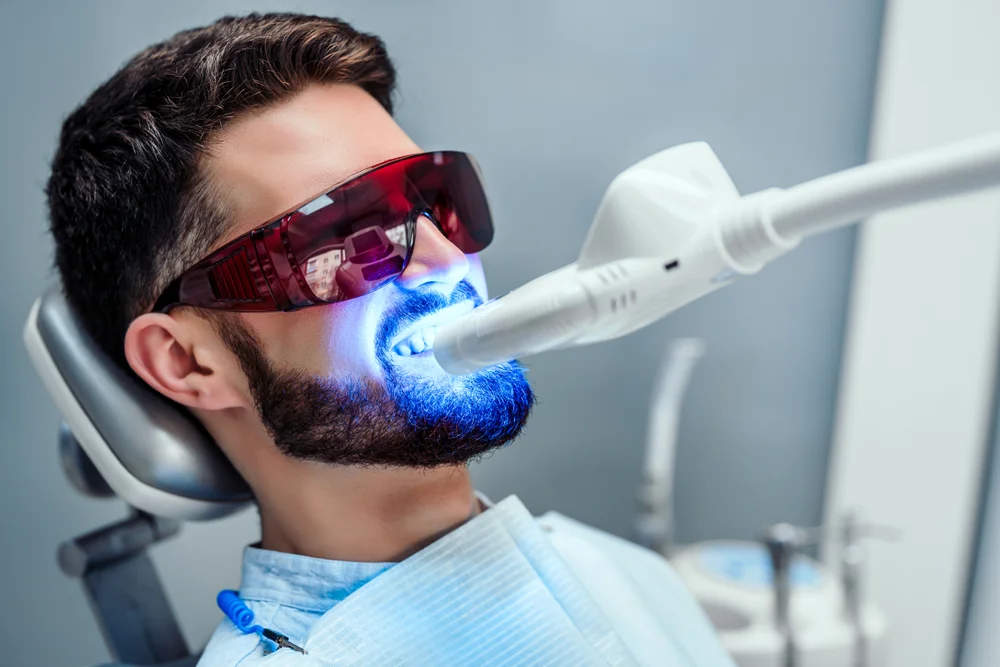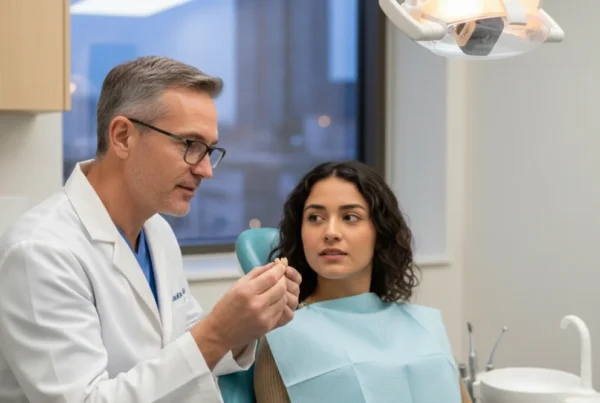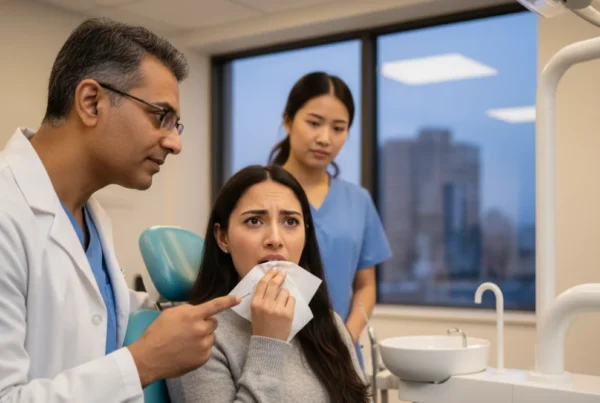When you’re staring at a knocked-out tooth in your palm, panic sets in fast. Your mind races: Can it be saved? What do I do first? How much time do I have? The truth is, what happens in the next few minutes will determine whether you keep your natural tooth or face years of expensive dental work.
But here’s the good news, most knocked-out teeth CAN be saved if you act quickly and follow the right steps. We’re talking about potentially saving thousands of dollars and avoiding months of procedures, all because you knew exactly what to do in those critical moments.
Handle it like your smile depends on it, because it does. That tooth isn’t just bone and enamel; it’s living tissue with microscopic cells clinging to the root. Pick up the tooth by the white crown (the part you see when you smile), never the root. A gentle rinse with clean water is fine, but resist the urge to scrub, you’d be destroying the very cells that could save your tooth.
Get it back where it belongs, fast. If you can handle it, try sliding the tooth back into its socket. Can’t manage it? Grab some milk and drop the tooth in, it’s like life support for those root cells. Whatever you do, don’t use water, which actually kills the cells you’re trying to save.
Every minute counts, seriously. You have roughly 30 minutes before your chances start dropping dramatically. Call your dentist immediately or get to an emergency dental clinic. They have the tools to potentially give you back your natural tooth, saving you from artificial replacements.
The difference between keeping your tooth and losing it forever comes down to these next few minutes. Don’t let hesitation cost you your smile.
Emergency Dental Readiness
When you’re confronted with a dental emergency such as a knocked-out tooth, the response time and actions taken are crucial to the tooth’s survival. It’s essential to react not just quickly but also correctly. At Grand Prairie Family Dental, our immediate care aims to protect your dental well-being and keep your smile intact.
The initial reaction to a dental accident should be calm and informed; panic can lead to hasty, incorrect choices. It’s important to know that a knocked-out tooth doesn’t mean it’s lost forever. Immediate action can preserve the tooth’s viability for re-implantation. Grand Prairie Family Dental educates patients on handling these emergencies with the understanding that the right knowledge leads to composed and timely reactions.
The importance of providing an optimal environment for a dislodged tooth cannot be overstated. If a tooth is knocked out, ensuring it remains moist and clean is crucial. Encased in a container of milk or a special dental preservation solution, the tooth can potentially be saved. At Grand Prairie Family Dental, we stress these preservation techniques to our patients, emphasizing their role in a successful dental restoration.
Contacting a dental professional promptly after an incident secures the opportunity for effective intervention. Whether it results in the successful re-implantation of the tooth or other necessary dental procedures, our office at Grand Prairie Family Dental is ready to deliver expert care when each second counts, providing treatments and advice that could make all the difference for your dental health.
Understanding Dental Emergencies
A dental emergency, such as a tooth being knocked out, mandates immediate and knowledgeable action. The success of re-implanting a tooth largely depends on the treatment received within the first 30 minutes following the accident. Understanding the correct steps to take can greatly improve the odds of saving the tooth.
The first point of action in a dental emergency is promptness. Recognize that the clock starts ticking the moment the tooth is detached, every second counts. It’s essential not to delay seeking help. Getting to a dental professional, like the team at Grand Prairie Family Dental, quickly ensures that you capitalize on the narrow time window for potentially saving your tooth.
The second focus area is tender handling of the tooth. Understanding the structure of a tooth is crucial; handling the tooth by its crown rather than the root preserves the delicate periodontal ligament cells, which are vital for reattachment. Avoid any harsh cleaning or contact with foreign materials that could damage these cells, as they are integral to the success of the re-implantation process.
Third, it’s also essential to have an astute awareness of appropriate temporary storage for the tooth should immediate re-implantation not be possible. Submerge the tooth in a preservation solution or milk, which simulates conditions similar to those in the mouth, to keep the cells on the root surface alive until professional care is available. This understanding can bridge the crucial time difference between the accident and reaching dental services, thereby ensuring you do everything possible for a favorable outcome.
Immediate Steps to Take When a Tooth is Knocked Out
If you find yourself in a situation where a tooth has been knocked out, it’s critical to know the immediate steps to take that can influence the success of saving the tooth. Ensuring proper handling, cleaning, and storage are the key initial actions before seeking professional dental assistance.
- Secure the tooth by the crown: Pick it up by the part usually visible in the mouth, never touch the root.
- Rinse gently: Clean the tooth with water only. Avoid soaps or chemicals.
- Store correctly: Use milk or a dental preservation solution, not water.
Following these steps gives the tooth the best possible chance for re-implantation once you arrive at a dental office.

What Not to Do: Common Mistakes and Misconceptions
When faced with the urgency of a dental emergency, it’s paramount to steer clear of certain actions that can jeopardize the chances of a tooth’s survival and re-implantation. Being aware of what not to do is just as important as the correct steps to save a knocked-out tooth.
- Don’t clean with chemicals: Soaps, alcohol, or disinfectants can kill the vital cells needed for reattachment.
- Never dry the tooth: Keeping the root moist is essential to preserving it for successful re-implantation.
- Avoid tap water storage: Water is not osmotically balanced for tooth preservation. Use milk or a commercial kit instead.
Avoiding these missteps can make a critical difference in a successful outcome. Grand Prairie Family Dental guides patients in recognizing these risks to ensure proper emergency response.
How Grand Prairie Family Dental Supports Dental Emergencies
In the midst of a dental emergency, knowing that you have dependable support readily available can significantly reduce anxiety and improve outcomes. At Grand Prairie Family Dental, our approach to such situations is comprehensive, involving prompt access to care, professional treatment, and personalized follow-up plans.
Immediate availability is crucial during a dental emergency. When a tooth is knocked out, time is of the essence, and the faster you receive care, the better the chance of saving the tooth. Grand Prairie Family Dental ensures that patients have access to urgent appointments. Swift action combined with our availability helps increase the likelihood of a positive outcome.
Professional intervention is key. Our team is equipped to handle dental emergencies with the necessary expertise and state-of-the-art equipment. Whether it’s re-implanting a tooth or providing alternative treatments, our dental professionals are prepared to manage the situation with the highest standard of care.
The journey to dental recovery doesn’t stop after the initial treatment. At Grand Prairie Family Dental, we understand the importance of tailored aftercare. We work with patients to create follow-up strategies that cater to their specific needs, ensuring that their dental health is monitored and supported throughout the recovery process and beyond. Our commitment to your dental wellbeing is our top priority, even after you step out of our clinic.
Preventing Tooth Loss: Protective Measures and Education
Preventing tooth loss starts with proactive strategies to guard against dental injuries. At Grand Prairie Family Dental, we emphasize the importance of protective equipment, regular dental visits, and education as foundational measures to keep your teeth safe.
Utilizing protective gear is the first line of defense against unforeseen dental injuries, particularly during physical activities. For individuals participating in sports or recreational activities where contact with the face is a possibility, wearing a mouthguard is a simple yet effective step to absorb shocks and protect the teeth from being damaged or knocked out. Grand Prairie Family Dental recommends custom-fitted mouthguards for optimal comfort and protection.
Regular dental check-ups form the second critical element in preventing tooth loss. Routine visits allow for early detection and treatment of any dental issues that may predispose teeth to injury. Regular professional cleaning also helps to maintain strong, healthy teeth better equipped to withstand accidental impacts. Our staff at Grand Prairie Family Dental works to schedule and maintain regular examinations for our patients.
Patient education is invaluable. By understanding the best practices for dental health, individuals are better prepared to avoid behaviors that can lead to tooth loss. We commit to educating our patients on proper oral hygiene routines, diet, and the risks associated with neglecting dental health. At Grand Prairie Family Dental, we believe an informed patient is empowered to make choices that promote a lifetime of healthy teeth.
Saving Teeth Starts with Smart Action
When a dental disaster strikes, every decision matters. The difference between saving your natural tooth and needing costly replacements often comes down to how quickly and correctly you respond in those first critical minutes.
Speed saves teeth, but smart action saves smiles. The clock starts ticking the moment that tooth leaves your mouth. Those precious root cells can only survive outside their natural environment for a limited time. But speed without knowledge can be dangerous. Knowing how to properly handle, clean, and store a knocked-out tooth transforms panic into purposeful action.
Having Grand Prairie Family Dental’s emergency contact information readily available isn’t just convenient, it’s potentially tooth-saving. When seconds count, you can’t afford to spend time searching for help.
Book an appointment with Grand Prairie, TX’s top dentist, Dr. Khademazad, today. It’s the first step to a better smile and increased self-esteem. Call us at 972-988-0900.
Schedule Your Consultation Today!
Grand Prairie Family Dental
2475 W Pioneer Pkwy Grand Prairie, Texas, 75051
Google Reviews: See More Reviews From Grand Prairie Family Dental
View information about local places in our community.
Driving Directions to Our Practice
Frequently Asked Questions
What should I do immediately if my tooth gets knocked out?
Time is everything when it comes to saving a knocked-out tooth. Acting quickly, and correctly, can make the difference between saving the tooth or losing it permanently.
First, locate the tooth and handle it by the crown (the part you normally see in your mouth), not the root. Gently rinse off any dirt with clean water, no soap, no scrubbing. If you can, try to place the tooth back in the socket and hold it there with gentle pressure. If that’s not possible, store it in a container of milk or a tooth preservation solution and call your dentist right away.
Can a knocked-out tooth be saved and how quickly should I act?
Absolutely, it’s often possible to save a tooth that’s been knocked out, but time is critical. The sooner you act, the better the odds of successful reattachment.
Ideally, you should get to your dentist within 30 minutes of the incident. The longer the tooth is out of the mouth, the lower the chances it can be saved. That’s why knowing what to do and acting immediately is essential to preserving your smile.
What should I avoid doing with a knocked-out tooth?
When your adrenaline is pumping, it’s easy to make a mistake that could cost you your tooth. There are a few things you’ll want to avoid at all costs.
Don’t touch the root of the tooth, as it contains sensitive tissue needed for successful reattachment. Avoid cleaning it with soap or chemicals, and don’t scrub it, even if it looks dirty. Most importantly, never dry the tooth out or store it in tap water. Both can damage the root cells and reduce the chance of saving the tooth. When in doubt, keep it moist and get to your dentist as quickly as possible.
Related Articles
Emergency Tooth Extraction, Dental Emergencies, Tips for Emergency Dental Care, Dental Emergency Symptoms, Emergency Dental Procedures, Emergency Dental Insurance, Dental Trauma and Injuries, Lost a Filling or Crown






